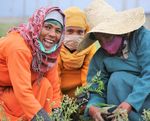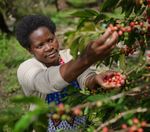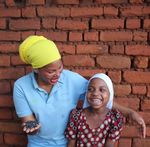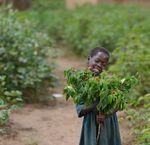FROM THE FIELD SPRING 2021 - Farm Africa
←
→
Page content transcription
If your browser does not render page correctly, please read the page content below
STAFF SPOTLIGHT: ANASTASIA MBATIA CHANGE IS BREWING IN UGANDA’S COFFEE SECTOR
After 17 years of working as a horticulture and business development In Kanungu, western Uganda, coffee is the fuel of the local economy and
expert in the private sector, Anastasia Mbatia joined Farm Africa a recent Farm Africa survey revealed that women are the backbone of the
in 2018 as Technical Manager of Agriculture. Based in Kenya, she industry. Despite that, female farmers see little reward from the profits
provides invaluable expertise across all of the countries that Farm they help to generate.
Africa works in.
Even though women do the majority of
Photo: Farm Africa /Jjumba Martin
Why did you choose Farm Africa? you’ll find I’m talking about work involved in growing, harvesting and
One of the reasons was its size. It’s sunflowers or cashew nuts. The drying coffee, in most cases men control
not one of those mega NGOs but at teams are also very different and I the marketing and sales activities. This
Farm Africa you can find experts; enjoy learning about new cultures. distinction means that often men control
we’ve been known for some time I feel I’m a part of every success household incomes and women are
as the go-to NGO in eastern Africa at Farm Africa, and - when I go to excluded from financial decision making.
because of this. I wanted to join farms and see the beaming smiles
this team of experts that find on women’s faces, on men’s faces In 2019, Farm Africa ran the Coffee is Life
solutions to problems. and I see healthy children - it UK Aid Match appeal. Our kind supporters
makes me sleep better at night! gave generously to the appeal and unlocked
What does your typical day look a total of £242,000 in matched funding from the UK government. These
like? If you could share a message with funds are delivering a project in Kanungu that helps women gain an equal
My day usually starts with Farm Africa supporters, what footing in the coffee value chain.
answering lots of questions! I get would it be?
requests coming in from all of the I am talking from the heart when Through the project, 160 village savings and loan associations are being
different projects. At the beginning I say thank you so much. Your supported to unite women to save together and make investments in each
of every day, I will also look out for giving really transforms the lives others’ businesses. More than 2,000 women taking part in the project will
potential agricultural threats in of the families we work with. Your also receive training in financial management and leadership skills.
each country and, if I find any, I will donations have a long-lasting
notify people in that country to be impact, enabling communities to “Farm Africa trained our farmers’ group on how to work together as a
alert. I’ll also work on long-term not be dependent on help all their cooperative. We learnt about village savings and loan associations and
projects such as writing training lives; you start them on a path that were taught to look at farming as a business, where record keeping is
materials. I juggle many different is bright. essential to monitor progress.” Patience – project participant.
balls!
Thanks to the skills and knowledge they’re gaining, the female coffee
What do you enjoy most about farmers of Kanungu are unpicking the myths surrounding their roles
your job? in the sector. The coffee gender gap is closing, and change is definitely
The diversity of the projects and brewing.
the teams I work with are things
I love about my job. Today I’ll be
talking about ginger, but tomorrow Our Coffee is Life project is funded by UK aid from the
UK Government who matched donations to Farm Africa’s
2019 Coffee is Life UK Aid Match appeal.RAISING A GLASS TO SORGHUM SUCCESS
In the Dodoma Region of Tanzania, many farmers grow sorghum to
feed their families. Market demand for sorghum is rising, opening up
an opportunity for farmers here to generate an income from this crop.
Unfortunately, many smallholders lack the yields and equipment to tap
into the commercial possibilities.
In this drought-prone region, hunger is a reality that many families
face during the regular dry seasons. During these times, many farmers
struggle to grow enough sorghum for their own households. The farmers
who do manage to produce good yields often lack adequate food storage
facilities, so their produce will rot before it can be used or sold.
It might not be possible to change the weather but, with a few small
changes, families who are struggling to get by can transform their farms
into thriving businesses. “The difference in my income means I have been able to build a new
house from selling sorghum, as well as being sure of having food. Our
Farm Africa is helping sorghum farmers like Elizabeth learn the best ways current house is made of cement blocks and a corrugated iron roof.
to plant and grow sorghum, as well as introducing them to a seed variety Before, we had a thatched grass roof on our house and there was always a
that is drought-tolerant. With better seeds and improved knowledge, lot of dust in the house – now, there is not.”
Elizabeth and farmers like her have been able to grow a surplus of crops,
even in dry conditions. To ensure that farmers’ impressive new
yields don’t go to waste, Farm Africa has
“I have been using improved linked sorghum growers to cooperatives
sorghum seeds. Before, I and warehouses where they can
was using local seeds and I store their produce in protective
was planting them randomly. environments, until it’s ready to be sold.
Currently, I plant them in rows.
Now that I use improved seeds, I Finally, to guarantee the road to
am able to make more income.“ success, Farm Africa is also linking
farmers to buyers; many farmers
Planting improved seeds and from the project are now selling their
adopting better production sorghum to Tanzanian breweries. Now
practices allows farmers to that’s success worth raising a glass to!
increase their food security,
as well as tap into a profitable
market.
A gift of £112 could help more farmers like Elizabeth learn
how to grow their incomes, ensuring more success stories
like hers across eastern Africa.
This project is funded by Irish Aid through the World Food Programme.FARMERS IN ETHIOPIA SEE THE FRUITS OF STRONGER TOGETHER: FARM AFRICA SUPPORTERS
THEIR LABOUR HELP COMMUNITIES BUILD RESILIENCE
In the Amhara region of Ethiopia, households rely on a 31km long We would like to say a huge thank you to everyone who donated to
irrigation canal as a source of water for drinking and for farming. our 2020 Winter appeal, helping to raise an incredible £123,000! Your
Recently, the canal was damaged by a flood, putting the livelihoods and generosity was overwhelming and will go a long way in helping farmers
health of 530 families at risk. build resilience to crises such as the coronavirus pandemic and desert
locust invasion.
Over the past decade, rainy seasons in
the region have become increasingly In the past year, these crises have “It’s also made the farmers we work
unreliable, leaving more and more presented huge threats to livelihoods with really think about, and prepare
farmers in the area dependent on the and food security across eastern for, that rainy day – they are making
canal to irrigate their farms. But when Africa, and some of the communities longer-term plans so they can save
the canal was damaged, many farmers Farm Africa works with have been for the future. This will prepare them
like Yimmer Ali, who rely on fruit more vulnerable than ever. in the event of another crisis. Having
production to earn a living, began to savings means they’ll be able to
lose their crops when the dry seasons But, with our supporters by our side, continue with their businesses and
came. we have been able to redouble our even continue growing in times of
efforts to maintain the momentum emergency.”
“Like my neighbours, water was no of our work and continue improving
longer flowing to my farm. I ended Unable to pay for the repair of the lives. Seeing the kindness of Farm Africa’s
up being dependent on rainwater, canal, local farmers came together supporters and the resilience of the
which has become irregular and and attempted to fix it themselves. But Anastasia Mbatia, Farm Africa’s farmers we work with, we know that
untrustworthy. I used to produce a lacking the right tools, their hard work Technical Manager for Agriculture, no matter what adversities the future
good amount of mangoes, using the didn’t pay off. has been working closely with the might bring, together we will be
sales of them to provide for my family. teams and communities on the ready.
But after the flood broke the canal, Hearing of the farmers’ efforts, Farm ground during this time. She told us:
I lost my produce. The rain was not Africa brought in a team of experts
sufficient to get my trees the water to support the repair of the irrigation “I was worried that the disruptions
they needed so they were not fruitful system and soon water was flowing caused by the coronavirus
like the other years and I faced a through the canal again. Yimmer is pandemic would bury the vulnerable
significant loss. This left me with no hopeful for the future: communities that we work with – but
profit.” so many of them have surprised
“Farmers have been able to continue us with their resilience. Since the
Not only did the damaged canal to grow onions and tomatoes since the pandemic, we have found new ways
jeopardise livelihoods, it also meant canal has been fixed. Crop producers of doing things using technology -
that households lost their source of are expecting to resume seasonal before there used to be resistance to
safe drinking water, putting them at production. I am sure the harvest next this but now people are embracing it.
risk of water-borne diseases. year will be amazing!”
Your support could mean the difference between
A gift of £62 could mean more farmers like Yimmer Ali
struggling and thriving for farmers in these difficult
receive a helping hand to protect their businesses.
times. Thank you for all your generosity!YOUR LIFE-CHANGING GENEROSITY
IN 2020 WE RECEIVED
£504,000 IN REGULAR GIFTS
FROM DONORS LIKE YOU
WE WERE LEFT MORE THAN
£488,000 IN WILLS BY OUR
GENEROUS SUPPORTERS
“I was advised to plant chillies by Farm Africa
and was shown how best to look after the crops
and how to dry them properly to a high quality,
so I can get good prices at the time of selling.
Chillies will change my life so much! The extra
income from chillies will help me send my FARM AFRICA RECEIVED
children to school.” OVER 8,000 INDIVIDUAL
Anyes, Uganda DONATIONS LAST YEAR
“Farm Africa showed me the success that’s
possible by growing sunflowers. Sunflower is a
crop that is likeable by many. I will never stop
farming them because I see they have a bright THE TOTAL GIVEN BY OUR
future! With the income I get from sunflowers I SUPPORTERS IN 2020
KIND
will guarantee that my son can finish college.”
WAS OVER £1.5 MILLION
Regina, Tanzania
THANK YOU!
9th Floor
Bastion House T: 020 7430 0440
140 London Wall E: info@farmafrica.org
Photo credits from top to bottom: © Farm Africa /
London EC2Y 5DN W: www.farmafrica.org Kevin Ouma; Chris De Bode/Panos Pictures for
Farm Africa; Farm Africa; Farm Africa /Jjumba
Registered charity no. 326901 (England & Wales) MartinYou can also read



























































